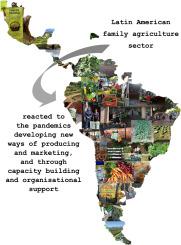Agricultural Systems ( IF 6.1 ) Pub Date : 2021-03-07 , DOI: 10.1016/j.agsy.2021.103098 P Tittonell 1, 2, 3 , M Fernandez 1 , V E El Mujtar 1 , P V Preiss 4 , S Sarapura 5 , L Laborda 1 , M A Mendonça 6 , V E Alvarez 1 , G B Fernandes 7 , P Petersen 8 , I M Cardoso 9 ,

|
CONTEXT
In Latin America, the so-called informal sector associated with family farming and the agroecology movements were instrumental at coping with and adapting to the COVID-19 challenges.
OBJECTIVE
To assess the nature and extent of the early initiatives (first three months) deployed by this informal sector to cope with and adapt to the impacts of the COVID-19 pandemic on food production and consumption in several countries of the region.
METHODS
We used key used informant consultation (n = 168), an online survey (n = 125) and the detailed characterisation of regional case studies (n = 4). Textual data was analysed and categorised using Reinert’s method, combined with similarity analysis.
RESULTS AND CONCLUSIONS
65% of the initiatives were ‘local’ in terms of geographic reach, 30% of them started within the first month after the pandemic and most of them were urban or urban-rural, whereas only 29% of them were exclusively rural. The analysis of the textual information captured through the survey revealed four major types of initiatives that were deployed or adapted in response to COVID-19:
- 1.
Direct producer-to-consumer food sales, generally existing before the COVID-19 crisis but adapted/strengthened to cope with it;
- 2.
Short value chains that linked rural and urban organisations and individuals supported by national or local governments, readapted through new health and safety protocols;
- 3.
Newly developed support and training programs on sustainable food production for self-consumption or local commerce, in rural, urban or peri-urban settings;
- 4.
Food assistance and aid initiatives focusing on vulnerable populations, relying on solidarity networks associated with the agroecological movement.
SIGNIFICANCE
The pandemic highlighted the key role played by local food systems and value chains and the need to strengthening them through public policies, as a way to build food resilience in times of crisis.
中文翻译:

拉丁美洲家庭农业和农业生态学运动对 COVID-19 危机的新反应——重新发现食物、农民和集体行动
语境
在拉丁美洲,所谓的与家庭农业相关的非正规部门和生态农业运动在应对和适应 COVID-19 挑战方面发挥了重要作用。
客观的
评估该非正规部门为应对和适应 COVID-19 大流行对该地区若干国家粮食生产和消费的影响而采取的早期举措(前三个月)的性质和程度。
方法
我们使用了主要使用的线人咨询 (n = 168)、在线调查 (n = 125) 和区域案例研究的详细描述 (n = 4)。使用 Reinert 方法结合相似性分析对文本数据进行分析和分类。
结果和结论
就地理范围而言,65% 的举措是“本地”的,其中 30% 是在大流行后的第一个月内开始的,其中大部分是城市或城乡,而其中只有 29% 完全是农村。对通过调查获取的文本信息的分析揭示了为响应 COVID-19 而部署或调整的四种主要类型的举措:
- 1.
直接生产者对消费者的食品销售,通常在 COVID-19 危机之前就已存在,但经过调整/加强以应对危机;
- 2.
在国家或地方政府的支持下,通过新的健康和安全协议重新调整,将农村和城市组织和个人联系起来的短价值链;
- 3.
新制定的关于在农村、城市或城郊环境中为自用或当地商业生产可持续粮食的支持和培训计划;
- 4.
依靠与农业生态运动相关的团结网络,以弱势群体为重点的粮食援助和援助举措。
意义
这场大流行凸显了当地粮食系统和价值链发挥的关键作用,以及通过公共政策加强它们的必要性,以此作为在危机时期建立粮食抵御能力的一种方式。











































 京公网安备 11010802027423号
京公网安备 11010802027423号